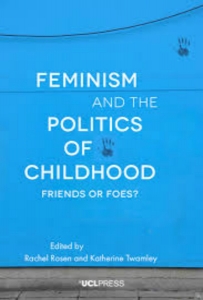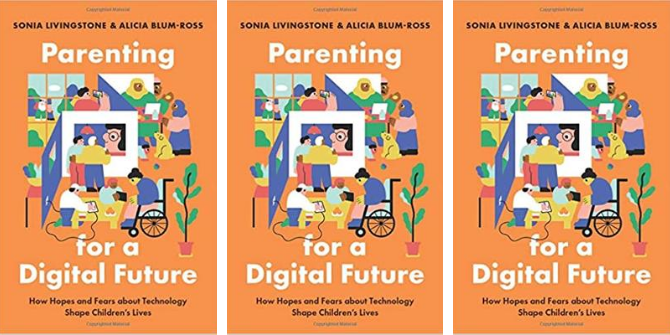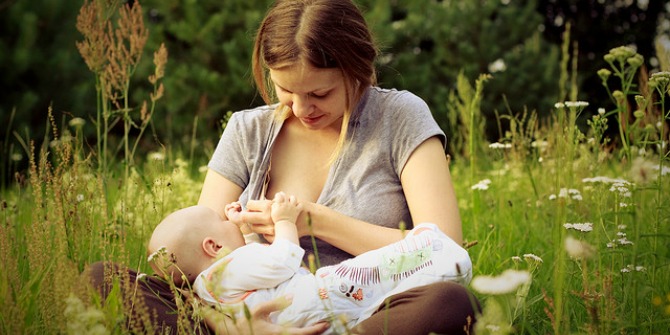In Feminism and the Politics of Childhood: Friends or Foes?, editors Rachel Rosen and Katherine Twamley bring together contributors to explore ways to think about women’s and children’s interests without assuming them to be antagonists or equivalents. Fabrizia Serafim welcomes the collection for providing a range of alternative theoretical constructs and practical examples of thinking relations with complexity.
Feminism and the Politics of Childhood: Friends or Foes? Rachel Rosen and Katherine Twamley (eds). UCL Press. 2018.

Is it possible to think about children’s interests and women’s interests without falling into sharply contrasting womenandchildren or women versus children patterns? Rachel Rosen and Katherine Twamley edited the collection Feminism and the Politics of Childhood because they argue that to answer this question is not only a promising, but indeed a crucial effort for women’s and childhood studies and related socio-political movements. The volume was preceded by an international two-day symposium on feminism and the politics of childhood held at University College London, UK, between 16-17 November 2015, and it is divided into three sections, beginning with more theoretically bent discussions of the tense encounters between gender and generation, followed by considerations of care labour regimes and experiences, before finishing with essays about political projects and movement-building.
Both the symposium and book have adopted rather original formats and involved academics and activists alike. For the former, papers were pre-circulated and then discussed in one large circle in the hope of encouraging dialogue and collaborative learning processes. For the book, all contributors were asked to read, comment and draw on each other’s chapters, going beyond traditional peer-review formats to engage in a co-construction of the end result. Despite the very welcome newness and the open access availability of the book, the editors recognise that some old problems remain, especially concerning stratified relations of knowledge production, given that there is no contribution from children and the number of articles from authors on the Global North is significantly larger than those on the ‘Majority World’.
In their introduction, Rosen and Twamley list three key themes that recur across the chapters. Inclusion of insights from the relational turn in social sciences is one of these, which can be exemplified by Rachel Thomson and Lisa Baraitser’s consideration of ‘mother’ and ‘child’ as relational entities that could enrich both childhood and maternal studies if bracketed and thought together without abstraction, maintaining a connection to their situatedness and concrete lives (see also ‘The Making Modern Motherhood’ research project’s website).
The other two recurrent themes are the employment of different vantage points to look at (or in, out, back) women and children; and the elaboration of alternative metaphors including weaning, struggle-in-relation, temporal lag or becoming-girl to both counter and cover gaps left by conventional imagery produced by prior feminist and childhood studies as well as traditional theories. These key themes are tremendously generative and should by themselves draw the attention of any reader interested in the conundrum of articulating interests which have for long been thought of as either antagonists or equivalents.
However, my attention, perhaps steered by my own projects and concerns at the time of reading, kept being drawn to two other themes that also appeared to be touched upon again and again. These are the necessity of the meaningful participation of ordinary human actors both when producing theory as well as in imagining political responses, and the need to consider political, cultural and economic contexts in order to bring forth social and economic justice for everyone. Let me draw some examples from the texts.
Debolina Dutta and Oishik Sircar remind us of the slogan ‘nothing about us without us’, used by sex workers as well as other organised movements, as something feminists and those who work with any community of people must learn – perhaps unlearning other assumptions first. Elena Fiddian-Qasmiyeh exasperatedly reports on how taking into account the opinions and desires of girl-children was not even considered a necessity by the different women involved in resolving a dispute in the case discussed regarding the Sahrawi Refugee Camps in Algeria. As Tanya Pace-Crosschild also teaches through the Opokaa’sin project, it is not possible to provide the necessary culturally-informed childcare welfare services without this kind of participation. These contributors all insist on bringing in concrete subjects and thinking of ways to actually attend to their participation.
Furthermore, Erica Burman argues that the answer to the relationship between women’s and children’s interests lies in structurally organised socio-political contexts and practices that not only constrain but also constitute these very relations. Merryn Edward’s photo essay explores one example of working-class women’s collective action against the austerity measures propelled by neoliberal state and capitalist forms of the (dis)organisation of childcare and reproductive labour, identifying the resistance against exploitation and not individual woman/child relationships as the major problem. Susana Borda Carulla’s analysis of the Colombian childcare programme, based on community homes run by women, explains that we cannot simply put children (or women, for that matter) first. Instead, we must attend to the social interdependency of their needs, interests and rights as well as to the social injustices they suffer, exemplified in her research on the infringement of the labour rights of the women responsible for performing care labour. In an interview with Rosen, Selma James asks: who else is responsible for the well-being of others? These authors all point outside: that is, to political, cultural and economic contexts.
The examples abound. In sum, when trying to answer the question posed by the book’s subtitle – if women and children or feminism and the politics of childhood are friends or foes – many articles redirect the question. They show us that research and activism concerned with women’s and children’s rights and social status should not reproduce traditional and mainstream notions of individualism, therefore focusing on independent and abstract subjects (liberal subjects). Instead, they point towards embodied, interdependent and concretely situated subjects (which can be thought of in dialogue with Martha A. Fineman’s theorisation of vulnerable subjects), who should not be treated as passive, observational objects of study or aid.
Doing so, the authors within the volume support not only those interested in exploring the junctures between gender and generation, women’s studies and childhood studies, feminism and women’s movements and childhood activism, but all those interested in theorising alternatives to neoliberalism and traditional political and social theory. They provide us with alternate theoretical constructs and practical examples of research on how to best make sense of the importance of relations and thinking with complexity.
Note: This review gives the views of the author, and not the position of the LSE Review of Books blog, or of the London School of Economics.
Image Credit: (Steve Snodgrass CC BY 2.0).









An open access edition of this book is available to download free from: https://www.ucl.ac.uk/ucl-press/browse-books/feminism-and-the-politics-of-childhood